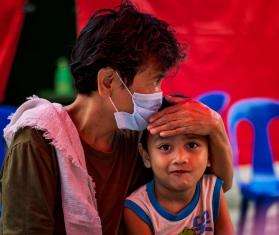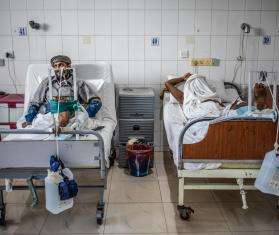A measles epidemic is gaining momentum in the Katanga region of Democratic Republic of Congo (DRC). Augustin Ngoyi is in Kabalo health zone, the epicenter of the outbreak, coordinating the response by Doctors Without Borders/Médecins Sans Frontières (MSF).
“It’s an extremely worrying situation. Every day we discover new deaths from measles within communities. Some days ago, we stopped at a village of 500 people, two-hour drive from Kabalo. The villagers told us that more than 30 children under five had died of measles in the past two months. One-third of the village’s young children were dead. This was confirmed when we visited the local cemetery, where we were surrounded by small, freshly dug graves.
In a nearby village, the situation was equally alarming, with a dozen children having died over the previous weeks.
Deaths Go Uncounted
These deaths are not being counted by the authorities, nor reported to health centers. The scale of the epidemic and the number of deaths due to measles are clearly being underestimated.
MSF is supporting the health authorities to get the epidemic under control. Our teams are actively seeking children with measles within communities and when patients have no complications, providing care to them directly on site. We are also distributing kits to health centers and training local health workers in how to treat simple cases.
For complicated cases, we have set up a referral system to Kabalo General Hospital. We already work in the hospital’s pediatric ward, caring for children with measles, severe malnutrition, and especially with malaria, which affects 60 percent of the children in our care. We are currently treating 60 children with complicated measles in the ward, and have treated more than 100 children within their communities.
Bikes and Canoes for Vaccination Teams
Measles is highly infectious, so to prevent it spreading, we are also vaccinating children aged between six months and five years in the 24 areas of the health zone. We have already vaccinated more than 17,000 children out of a total of 41,000, and are making progress every day.
Working in this region presents enormous logistical constraints. The Kabalo area is huge, and the roads and tracks are often in a poor state, so getting to certain villages can be a challenge. Our teams often have to leave their vehicles and continue by motorbike or in canoes to reach people who themselves may have had to travel long distances on foot to reach sites where their children can be vaccinated or receive care. This greatly slows down progress.
Cut Off by Road and Rail
Getting supplies in is even more challenging. For several months, the main road that links this area with other cities has been cut off because of work. And fuel shortages mean that trains no longer reach the area. As a result, supply chains are no longer functional, and health centers are suffering unprecedented shortages of medicines. The few drugs that are available cost more than most people can afford, so people don’t bring their sick children to health centers for treatment.
On top of this, administrative obstacles in obtaining visas have substantially delayed the arrival of additional experienced MSF staff, preventing us from deploying more teams to speed up the response.
All of these factors are making the epidemic worse. New cases of measles are appearing every day in the Kabalo health zone and elsewhere in Katanga province, but the number of organizations involved, and the means allocated for responding to this emergency, are clearly insufficient.”
Read More: Katanga Measles Epidemic keeps Worsening





